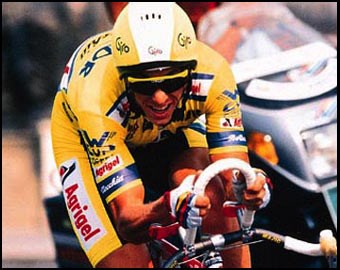Greg LeMond joins the most extensive Play the Game conference so far

Tour de France winner Greg Lemond
20.05.2009
Play the Game 2009, the sixth world communications conference on sport and society, is presenting its most extensive conference programme so far. Compared to the two former Play the Game conferences, held in Iceland and Denmark, both with a total of 85 presentations, this year’s edition in Coventry boasts around 120 speakers hailing from 27 countries.
“Thanks to the speakers, we can present not only the broadest programme, but also the highest quality of debate in the 12 years we have been arranging Play the Game,” says director Jens Sejer Andersen.
“And having 120 media people, academics and sports practitioners on board leads us to believe that Play the Game will again serve as an excellent forum for multi-disciplinary networking, which is one of the most important functions of our conference.”
One of the latest international top names to confirm their presence is the three-time Tour de France winner Greg LeMond, who will speak about current challenges to anti-doping policies, drawing from his life experience as a world class elite athlete and a fitness industry entrepreneur of today. Greg LeMond was one of the first professional cyclists who openly debated doping.
Greg LeMond, David Howman, Alessandro Donati, William Gaillard and other experts discuss doping
Greg Lemond will join the Director General of WADA, David Howman, in the doping session which also now features a senior representative of the pharmaceutical industry, Anne-Marie Kappelgaard from Novo Nordisk, who will speak about which measures the industry can and cannot take in the fight against doping and illegal drug trade.
The winner of the Play the Game Award 2007, the Italian anti-doping expert Alessandro Donati, will this time reveal the close links between the sports world and the cocaine trade.
William Gaillard, Director of Communications at UEFA and personal advisor to its president Michel Platini, will lay out how European football can tackle the current economic crisis. He will be complemented by leading sports economists such as professors Wladimir Andreff and Stefan Szymanski and the deputy head of sport at the European Commission, Pedro Velázquez.
New sessions
In the new programme a number of new sessions have been added: abuse of animals in sport, discrimination of female athletes, new methods in investigative sports journalism, fan violence among others.
Match fixing, corruption and good governance, paralympic athletes, teenagers, the impact of Beijing 2008, sport in development… vital issues for sport that will be debated across professional and geographical borders at Play the Game in Coventry.
Take a look at the updated programme on our website by clicking here.
Programme change
Due to serious illness in his family, Play the Game regret to inform that Secretary General Peter Mühlematter of the International Handball Federation Tuesday, 19 May told us he had to cancel his speech at Play the Game 2009. We wish Mr. Mühlematter and the family all the best.
-
Andrew Morgan,
Houston TX,
11.06.2009 08:52:
Great to see Greg Lemond's continuing promotion of drug-free cycling. Greg you have my support, keep up the fight.





